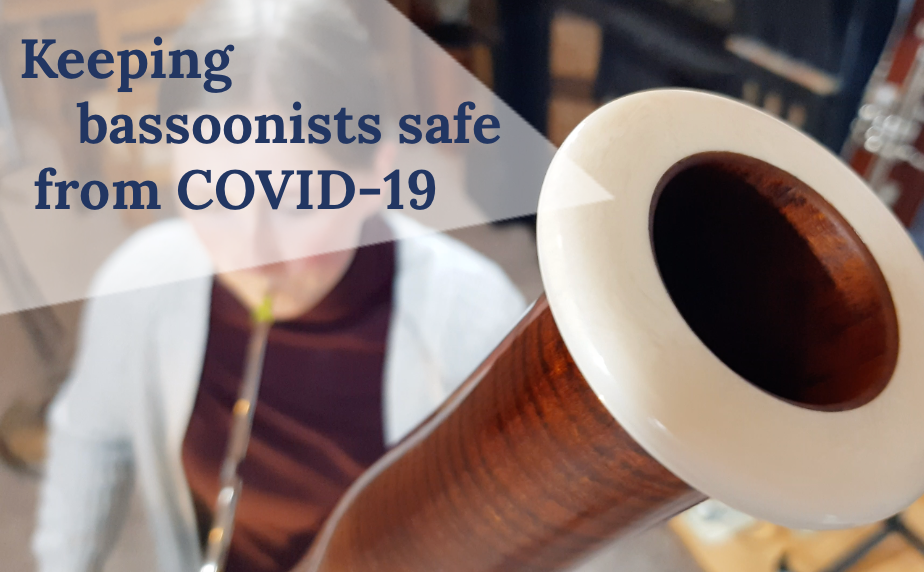Keeping bassoonists safe from COVID-19
March 20th, 2020

Keeping bassoonists safe from COVID-19
Article Author: Martin Ludlow, In-House-Bassoon Specialist and Director at Double Reed Ltd.
Keeping bassoonists safe from COVID-19
The safety of our customers and staff is of paramount importance and we have introduced a comprehensive set of procedures in order to safeguard everyone connected with the business.
Our starting point when considering how to respond to COVID-19 is our current business model and the vulnerabilities it throws up.
Our Business Model Already Conducive to Combatting COVID-19
In this regard, we are already well placed. Our most significant line of defence against the transmission of COVID-19 is that we are an internet-based business so we have very little personal customer contact; virtually all our business is carried out at a distance via couriers and Royal Mail.
Unlike other bassoon vendors, we do not have a shop where the general public can handle instruments or their accessories, so there is no staff-to-customer transmission or vice versa, and we can clean instruments and accessories and keep them clean until bought by a customer.
We are specialists selling just bassoons and their accessories, which means that we sell only small numbers of relatively expensive instruments (no cheap flutes, recorders or ukuleles for example) and so can afford to invest the time in thorough cleaning, which cannot be justified for cheap instruments.
Because everything is transacted by post, we have a much more controllable working environment, keeping staff much safer and therefore our instruments much safer.
In addition, as specialists selling high value instruments we have the mindset suited to handling a crisis such as this. We have already invested in the best staff, equipment and procedures available; and we already allocate ample time for the meticulous preparation of bassoons to the highest standards. Moving to an anti-COVID-19 strategy is just an extension of this culture.
Bassoons and Accessories Our Key Focus
Consequently, our primary concern is that there is no risk of COVID-19 being present on the instruments and accessories we send to customers rather than direct staff-to-customer transmission. Double Reed’s policy with regard to the safe handling and sale of bassoons, reeds and accessories is based on the latest scientific findings on COVID-19, as summarised in the inset box at the end of this article.
As bassoons comprise a mixture of materials, and also because they are blown into, they offer a complex challenge. Our procedures have been drawn up by a degree-qualified biochemist, who has been able to understand the science behind the virus and its transmission together with the complexities of treating bassoons to remove any trace of COVID-19 without harming the instruments.
In essence our procedures follow two tracks:
Track 1: to handle and treat bassoons and accessories in such a way that, if COVID-19 is present, it is removed on arrival at our premises and is not (re-)introduced onto them prior to their being sent to customers
Track 2: to minimise the risk of staff bringing COVID-19 onto the premises and transmitting it to other staff and/or bassoons
Track 1: Handling and Treatment of Bassoons, Reeds and Accessories
Covid-19 has a soft lipid (fat-based) outer layer rather than the harder outer layers found in other viruses such as norovirus. This means that it does not persist in the environment as long. It also means that it is destroyed more or less instantaneously when in contact with soap, detergent or alcohol (at 60% plus concentration) as these all dissolve fats. It is also destroyed by exposure to UV light, either in sunlight or from an artificial UV light source.
The first line of defence against Covid-19 therefore is time – anywhere between three hours and three days, depending on the surface, is enough to destroy the virus completely. Our first procedure upon delivery, then, is to quarantine all instruments, reeds and accessories for three days (less the time in transit).
Following that, depending on whether it is a bassoon, crook or case, and what we are going to do with it next, we will apply a range of other treatments as appropriate using one or more of:
- Soap solution
- detergent solution
- pure alcohol; and
- UV exposure in our UV light box
Crooks are the most risky part of a bassoon, and these are dropped in a bath of pure alcohol or soap solution before any other procedure.
The methods of treatment are also designed to avoid any COVID-19 being transmitted into the environment or to members of staff during treatment, so vigorous cleaning which disperses droplets or dust is avoided.
From then on, we move to Track 2 (see below) until we reach the point at which the bassoon is to be despatched to a customer, when elements of Track 1 are again applied to ensure safe receipt by the customer.
Track 2: Minimising Risk to Staff
We have instituted a rigorous set of procedures for staff to minimise the risk of person-to- person, person-to-instrument and instrument-to-person transmission, including:
- regular, thorough cleaning of the premises, work areas and equipment
- separation of staff, instruments, accessories, tools and work areas so that as far as practicable members of staff are separated from each other and don’t touch or use the same things
- protection of hands by regular washing and use of gloves
- provision of gloves, cleaning materials and disposal bins at each work station
- avoiding more than one person playing/testing/repairing any instrument
Summary of current COVID-19 knowledge baseTransmission:
Viability outside a host: Current evidence suggests that the virus can remain viable outside a host for:
Killing the virus: The novel coronavirus responsible for COVID-19 is susceptible to any product which effectively breaks down the fatty lipid layer which protects the virus including:
|




